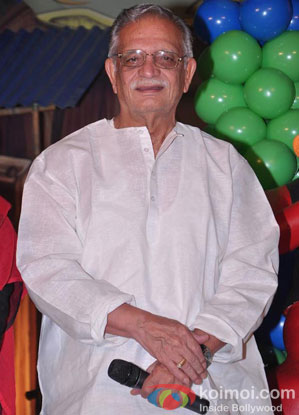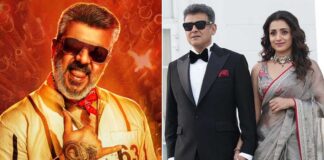
Regarded as one of India’s finest poets, Gulzar has survived decades of Bollywood. His seen it all experience translates into words which will echo for years. There is magic in the poetry he creates. At a cue in Ijazat, Naseeruddin Shah tells his ex-wife Rekha, “Wahi shehar, wahi gali, wahi ghar – sab kuch wahin nahin hai, par hai wahin, usi jagah.” An estranged couple meet years later at a railway station and on being asked by the wife where he stays now, this is what he replies. The intensity of the 1987 film has still not faded out. And when you meet Gulzar Sahab, you realize his timelessness comes from the fact that he has a great understanding of people, has a quest to learn from younger folks and his muse was never the world around him but the script he is handed. At 80, and still able to deliver a Kill Dil and Aao Na with such passion is only something a versatile genius can do and Gulzar is that and much more.
Koimoi had the honor of engaging in tete a tete with the poet, filmmaker, script writer and Grammy Awardee, Gulzar Sahab.
’Sweeta’ is great because besides Adnan Sami returning back after a hiatus, we also hear your voice in the song. How did that come through?
In the composition of the song, Shaad wanted to start with an adlib and even the music directors agreed to do the same. They worked out a form by which before the music starts, it was necessary to have a certain adlib narration. Hence I wrote those couplets matching to the song. So that’s how I decided to use my voice for the song. It was completely Shaad’s decision using my voice. When it becomes Shaad’s discretion and he is keen on it, it is welcome. I admire his work. I have done 3 films with him before, from Saathiya to Kill Dil it is a journey we have shared together. I thought he will use it correctly.
This is the fourth film you are working with Shaad. Does he come and give you a brief on how to go about the songs.
I don’t do any film till I have the full script in my hand. I have not done any film like that. Shaad by principle works out his films before he starts. Before he begins filming, his scripts are ready from the first to the last word. And that’s what I like and respect about Shaad. Whichever film you are associating yourself with, you must be well versed with the story and genre of the film. It is important to know it. Since, I know a little bit of filmmaking myself which I had done in my times, I understand that medium. I run with the script. It is important to the characters too. Not every character will speak the same way and thus, every character cannot sing the same way. If every character is speaking differently, they are naturally singing distinctly. I must match the language of the song to the dialogue of the character. It is thus important for me to know the script!
How do you choose your projects? Is it your previous working history with Shaad that gives you the kind of confidence you show in his films?
When Shaad first approached me with the script, there were a few things I did not like. He reworked on the script of the film. That is what is sharing a script and sharing a film. Since I have shared this journey with him, I have a few reservations about the script. He agreed with me and he accepted my opinions and that’s why he reworked on the script. When he got back to me with a revised script, I liked it very much. The energy of his characters and the film latched me to it. This is Shaad’s specialty that in Bunty and Bubbly, his characters sold Taj Mahal. His ability is that with such conviction he sold Taj Mahal to the audiences as well. It’s that kind of energy that I like in his films.
Does Shaad too give you feedback and ask you change lines when he deems necessary?
Coming to the reservations, they were all rectified by Shaad. And it’s a symbiotic relationship that a lyricist and a filmmaker share with each other. In songs also, a number of times I give out the story, I give out the lines and he reacts to it and asks me to change the lines. There are times we react on a tune by Shankar Ehsaan Loy. We often consider whether the songs are becoming too grim or its becoming too light. The songs are an expression of music; it is not about a bad tune or a good tune, a bad song or a good song. It’s about what matches with the film which equates to what matches with the situation.
How was it working with Shankar Ehsaan and Loy? They are a bunch of musicians who have a freshness in their music.
These three musketeers Shankar Ehsaan and Loy are wonderful. And they are so spontaneous. That’s the most beautiful part of working with them. Shankar is a problem to handle sometimes (laughs) ‘Usko jo bhi line do, uski fauran tune bana leta hai’. You can be swayed by his tunes easily. I have to be very careful, keep the words polished and intact because the tunes come so easily and so naturally to him. He asks me to change the words sometimes and whatever he creates goes so beautifully with the situation and the film’s flavor.
Where do you think is a lyricist placed in the film’s infrastructure and skeletal framework?
A lyricist is like any other technician in the film. Like there are several takes with the lighting and for the actors in front of the camera, similarly there are multiple drafts and amendments of the songs (no matter which lyricist it is coming from, even a veteran like Gulzar). It has to be taken in that spirit. The beat of Kill Dil was created between Shaad and Shankar Ehsaan and Loy, and they created it very well. I adapted it because that was the title of the film. That’s how songs are written out. I am not writing a Mahabharat or a Gita.
When you are sitting to write a song and you have written your script, what works as the final inspiration for your words
My inspiration to write songs for any film must come from the script alone. I am not writing an independent poem. What I am writing is drawn from the characters and their relationships. The hero in this film is very different and the relationship they share is very enticing. For the song of Govinda, I had bring about pain and cruelty in equal measures because he has brought up the two children (Played by Ranveer and Ali) in the film. My muse is created in understanding how do you tackle that relationship between Govinda, Ranveer & Ali. The instigation and creativity entirely lies there. Normal love songs of a girl and boy are easy, but the more complex the characters are, the more challenging it is to translate them to words.
Now, enjoy reading koimoi.com on your Windows Phone, iPhone/iPad and Android Smartphone.



 Follow Us
Follow Us







